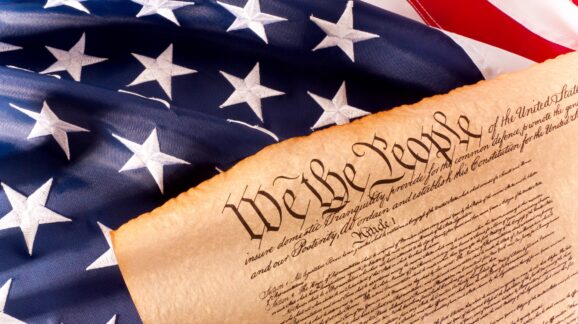Subsidy-free capitalism may require a constitutional amendment

Photo Credit: Getty
Automobiles, electrification, ample consumer goods and mass marketing, a construction boom, and access to credit helped fuel the Roaring Twenties of a century ago.
This century’s Roaring Twenties has plenty of advances to be proud of and to celebrate as well; but the festivities also prominently feature an overabundance of taxpayer dollars flowing freely into the coffers of private companies, something that tends not to end well. Last week’s Syracuse, NY stop on Joe Biden’s CHIPS and Science Act tour showcased this trend, with Biden proudly proclaiming that law’s $280 billion in dangling incentives had lured corporate America into the fray to do his top-down bidding.
The CHIPS and Science Act is the baby of the Big Three, with the inflation law and the infrastructure law each costing over a trillion.
Today’s ready acceptance of subsidies and the resultant federal bloat, including staggering interest payments topping $1 trillion this year, raises questions about the fundamental purpose of government.
As I described over at Forbes, the absence of subsidies among the enumerated powers of the federal Constitution hasn’t deterred their rise to a dangerous prominence. Despite evidence showing the shortcomings of economic and social engineering subsidies, market interventionism remains popular and unabated much to the chagrin of free enterprise advocates who have yet to persuade policymakers—who often know better—to reject them.
Subsidies famously privatize profits while socializing losses. They distort markets and steer talent into unproductive ventures; they can hinder genuine regulation by shielding actors from liability. Moreover, subsidies are accompanied by regulatory strings and chains, which in Biden’s America means the coercive promotion of progressive policies and an expansion of the administrative state’s reach.
The history of state-level subsidies offers valuable lessons, as described in an important Mercatus Center paper called “Outlawing Favoritism: The Economics, History, and Law of Anti-Aid Provisions in State Constitutions.” While most 19th-century state constitutions contained or added clauses to prohibit private aid, loopholes emerged, leading to a resurgence of subsidies.
What became known as the Public Purpose Doctrine became a convenient court-affirmed justification, allowing private aid subsidies to expand under the guise of serving the common good.
To address this issue, some states have been exploring interstate compacts to jointly end corporate welfare. However, and particularly given that Congress would need to approve interstate compacts anyway, a more comprehensive solution may lie in a constitutional amendment banning subsidies and public-private partnerships at the federal level.
An Anti-Aid Amendment to the US Constitution, one model version of which I sketched out in the Forbes article, would restrict federal government subsidies, loans, and grants-in-aid to corporations and private entities, and ideally state versions of the same.
Such an amendment would reaffirm government’s role in impartial governance and fairness, and, in its more perfect iteration, address and limit the emergency declarations of the sort Biden uses to justify spending and regulatory proclivities.
Ending subsidies would not only curb government overreach in the form of both spending and regulation, but also allow for broad-based tax cuts as a cherry on top, since government would be getting out of the business of business, where it has no business monkeying around.
It’s past time to prioritize free enterprise over crony capitalism, and it is unfortunate that an amendment restoring some semblance of original intent may be the only way to do it.
For more see “A Constitutional Amendment Banning Subsidies, Grants And Loan Guarantees,” Forbes, April 29, 2024, https://www.forbes.com/sites/waynecrews/2024/04/29/a-constitutional-amendment-banning-subsidies-grants-and-loan-guarantees/?sh=32f2d2f861d3.